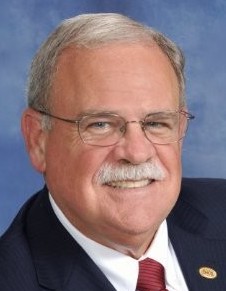WASHINGTON, DC – President Biden has prioritized a major infrastructure bill, but negotiations at press time remain stalled within the highly partisan atmosphere of Washington, D.C. What are the odds that the legislation will pass? If it passes, what will it look like? What should it look like?
Third Thursday asked for opinions and predictions and we were not disappointed. See below to find out what friends and colleagues are saying about legislation that could fuel a massive wave of construction, and no doubt keep construction law attorneys busy with the inevitable issues that arise.
What Are The Odds That An Infrastructure Bill Will Pass?
“The prospects are very good for passage of an infrastructure package, but the policy changes that many are advocating for as part of the package may have a harder time becoming law if the negotiations breakdown again and the bill has to go through the reconciliation process. Procedurally, those policy issues are subject to the Byrd Rule that prohibits anything that is not budget-related from riding on a reconciliation bill.” — Cathy Lilford Altman, partner at Carrington Coleman, Dallas

“The odds a bill will pass in some form seem fairly high. Unfortunately the definition of ‘infrastructure’ as it is being currently discussed includes such things as home health care assistance and business development which, in addition to being ill defined, fall outside the traditional scope. While such things may be legitimate legislative goals (that is a separate discussion), adding them to a funding discussion aimed at traditional infrastructure creates additional and unnecessary basis for opposition. The better approach might be to separate the two rather than risk losing support for traditional infrastructure (which appears broad) over an attempt to include non-traditional issues.” — Frederick F. Butters, PLLC, Southfield, Michigan
“I believe some form of an infrastructure bill will ultimately pass. President Biden has stated his commitment to it as his next major legislative initiative and it will provide much needed repairs and updates to the country’s aging infrastructure as well as an influx of money and jobs into an economy that is recovering from the pandemic. What the size and scope of the bill will be, how it will be paid for, and whether it will pass with bipartisan support or through the reconciliation process as the COVID-19 relief bill did are the key issues that remain to be hashed out over the next several months and will ultimately determine the success of the plan.” — James S. Malloy, Dingess, Foster, Luciana, Davidson & Chleboski LLP, Pittsburgh, Pa.

“I think we first need to consider the definition of infrastructure. The Democrats have broadly defined the term to include not just traditional infrastructure (highways, bridges etc.), but also an array of social programs. Republicans, on the other hand, are staying with the traditional definition of infrastructure. I think there can be an agreement at least on a bill that is directed to traditional infrastructure and that Congress should be able to come to terms on that. But there is currently significant maneuvering by both parties and the Biden administration and so the content of a final bill is hard to predict.” — Edward Seglias, senior partner and vice president, Cohen Seglias Pallas Greenhall and Furman PC
“If we knew that, we would be at the casino making bets right now. The bottom line is there appears to be broad, bipartisan agreement about the need to improve our aging and overburdened infrastructure. The challenge is figuring out the best way to pay for it. The President would like to increase the corporate tax rate to pay for it, while many Republicans have suggested using unspent coronavirus relief funds to pay for it. There are also disagreements about what constitutes infrastructure. The President has taken a very expansive view to include a host of social programs that do not involve construction work. And many in Congress are troubled by the wide range of regulatory and environmental regulations the President is seeking to add to an infrastructure bill. They – as do we – worry these new requirements will undermine the benefits of the proposed new infrastructure investments.” — Brian Turmail, vice president, Public Affairs & Strategic Initiatives, AGC of America
What Type of Infrastructure Bill Would You Favor?
“A package that addresses funding shortages for highways, bridges, transit and railway projects, airports, water and sewer systems is critically important. Likewise, building out rural broadband and addressing resiliency in the electric grid is crucial. As long as the plan relies solely on tax increases for funding, drastically expanding the scope and cost to cover things like building improvements and electric vehicle charging stations is harder to support without further consideration of the economic impact.” — Cathy Lilford Altman, partner at Carrington Coleman, Dallas
“While traditional infrastructure is always a pressing need, there should be some concern over the magnitude of the debt that will accompany it which must be balanced with the economic impact of any accompanying tax increases. With US debt now exceeding GDP adding debt should perhaps be a bigger concern than it appears to be, which will not bode well over the long term. While I would view measured support for traditional infrastructure favorably, I am not anxious to see a massive expansion in overall debt.” — Frederick F. Butters, PLLC, Southfield, Michigan
“Whatever type of infrastructure plan is passed will also have to deal with the current challenges of labor shortages, escalating material prices, and supply chain issues to name a few. We are hosting a discussion of the infrastructure bill at this year’s Construction SuperConference in December. By that time, we hope that an infrastructure bill will have passed answering some of these questions so that we can analyze the impact the bill might have on the construction industry with our panel of construction and legal industry experts.” — James S. Malloy, Dingess, Foster, Luciana, Davidson & Chleboski LLP, Pittsburgh, Pa.

“We certainly hope that a compromise will be reached. Investment in all aspects of America’s infrastructure is sorely needed. If agreement cannot be reached on the administration’s broad program, let’s get agreement on more traditional infrastructure investments rather than lose this opportunity. Our bridges, roads, highways, airport, sewage, public transit, and energy systems are decaying. There is no time to waste.” — Paul G. Monte, managing partner, Peckar & Abramson, New York
“It is important to pass a bill that relates to traditional infrastructure as soon as possible. In fact, it should have happened during the last administration, but for entirely political reasons it did not. As many know, particularly in the construction industry, our roads, bridges, ports and other public transportation structures are in critical need of repair. There are not only important safety issues at stake, but also economic issues related to our competitiveness that have lasting implications. Getting a traditional infrastructure bill passed now is one of the most urgent issues that Congress faces and our political leaders need to take a nonpartisan approach to it.” — Edward Seglias, senior partner and vice president, Cohen Seglias Pallas Greenhall and Furman PC
“We are for an infrastructure bill. While some of our members build infrastructure, all of them rely on it to be successful. Our members don’t have warehouses at construction sites where they can store building materials onsite for months at a time. They are hyper-reliant on infrastructure for just in time deliveries of key materials and project components. Likewise, they don’t have dorm facilities at their project sites. Their workers rely on infrastructure to get them to the job site safely and on time. Our preference is for a robust infrastructure measure that focuses on improving public works like roads, bridges, schools, police stations, etc. Such a measure should be multi-year and politicians should avoid the temptation to stifle the economic benefits of these new infrastructure investments by adding on a host of new regulatory burdens.” — Brian Turmail, vice president, Public Affairs & Strategic Initiatives, AGC of America

“I strongly support an infrastructure bill. The non-partisan ASCE survey of infrastructure clearly and unequivocally supports the need for a major infrastructure effort in the nation. It appears that most members of Congress are narrow sighted in that they look at infrastructure as only highways and bridges. They appear to ignore the need for airport expansion, mass transit support, clean energy projects, wider availability of internet access, etc. All of these are part of the infrastructure needs of the U.S.” — James G. Zack, Jr, principal, James Zack Consulting, LLC, Johnstown, Colo.


